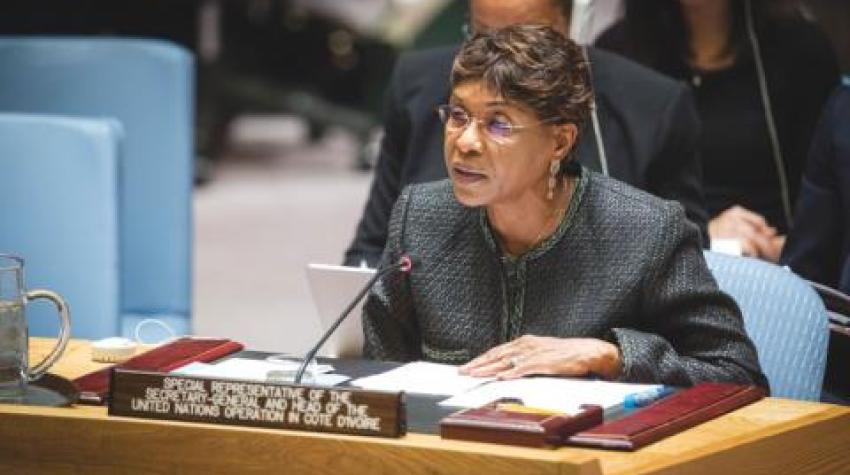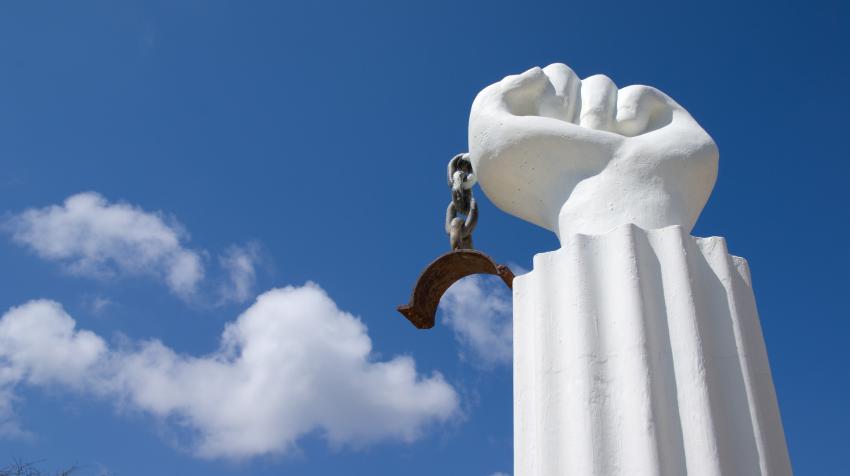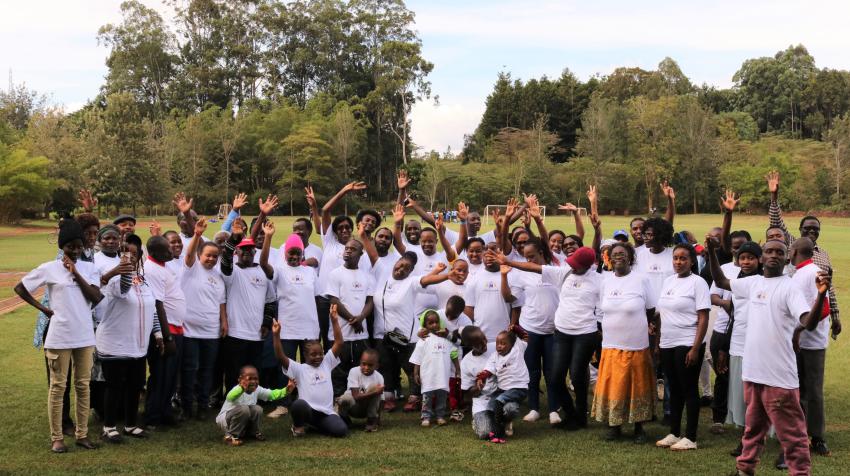September 2015, Nos. 1 & 2 Vol. LII, The United Nations at 70
Over the past 70 years, the scope of the work of the United Nations has expanded greatly, to include issues such as climate change, sport for development and peace, and road safety. When I look back however, I feel that the United Nations has played the most significant role in those areas that are at the core of the Charter of the United Nations: the maintenance of international peace and security, the promotion of human rights for all and self-determination of peoples, and other economic, social and cultural issues including governance and development-related concerns. It has also proven itself relevant in providing hubs aimed at mobilizing and harmonizing efforts of Member States towards achieving its thematic goals.
This is probably nowhere more true than in Africa. Following the establishment of the United Nations and adoption of the Charter in 1945, various peoples in Africa gained awareness of their fundamental rights and felt empowered in their respective struggles for self-determination. Article 73 of the Charter, calling for “self-government” and “the progressive development” of “free political institutions, according to the particular circumstances of each territory and its peoples” gave African peoples new hope to be masters of their own future. The United Nations General Assembly gave them a forum in which their political aspirations could find voice and support.
In 1960, a crucial year for both Africa and the United Nations, 15 African countries gaining independence. In September of that year, 17 new States were admitted to the United Nations, 16 of which were from Africa. Also in 1960, the General Assembly adopted the Declaration on the Granting of Independence to Colonial Countries and Peoples, a landmark document which states that all people have a right to self-determination and proclaimed that colonialism should be brought to a speedy and unconditional end. Beyond self-determination legislation, the United Nations General Assembly was looking for a comprehensive and efficient frame- work that could lead new independent African countries to effective political and economic sovereignty, as illustrated by the adoption in 1962 of the resolution on “permanent sovereignty over natural resources”.1
The post-colonial era, however, proved a challenging time. Newly independent States lacked strong democratic institutions, and became the theatre of civil conflicts whereby rival ethnic, religious or other groups fought for access to power and resources. Aware of the threat such conflicts posed to regional peace and security, the United Nations sought to address them, including through the good offices of the Secretary-General and his Special Envoys and through the deployment of increasingly complex peace operations.
A key moment in the history of Africa and of the United Nations is the establishment of the first peacekeeping operation on the continent, that is the United Nations Operation in the Congo (ONUC), on 14 July 1960 (by Security Council resolution 143 (1960)). Deployed in response to the political upheaval and conflict that marred what is today the Democratic Republic of the Congo at the dawn of its independence, the operation counted, at its peak strength, nearly 20,000 troops.
Fast-forward 55 years and West Africa has the highest concentration of United Nations actors of any region of the world, including four peacekeeping operations (in Côte d’Ivoire, Liberia, Mali and until recently Sierra Leone), a peacebuilding office in Guinea-Bissau, a regional operation addressing the Ebola outbreak (United Nations Mission for Ebola Emergency Response (UNMEER)), a Special Representative for West Africa and a Special Envoy for the Sahel, and a wide range of United Nations regional and country offices. The region also hosts the United Nations Department of Political Affairs-led regional office, the United Nations Office for West Africa (UNOWA), the first of its kind, to harmonize and enhance efforts towards conflict prevention and peace consolidation within West Africa.
It has been said that the “promise of West Africa has fallen short”, due to a series of civil conflicts that have affected most countries in the region. I believe that the enormous challenges facing the region are sometimes overlooked. The strategic position of West Africa—on the Atlantic for relatively easy access to the Americas and yet close to Europe—has made it an area over which international geopolitics has significantly impacted the situation in several countries. Its vast natural resources— including cocoa, diamonds, gold and oil—have attracted foreign investors with the intent to exploit them. In order to strengthen their influence in the region, various foreign actors have lent support—be it political, military or financial—to local groups, changing the internal dynamics and often fuel- ling conflict within countries and the West African subregion. In fact, civil conflicts in West Africa typically have a regional as well as international dimension, as a result of the political, ethnic and religious ties that span the region’s porous borders.
Over the past 20 years, the United Nations has played an important role in helping address the challenges facing West Africa. In countries where conflict escalated posing a major threat to peace and stability—as in Côte d’Ivoire, Liberia, Sierra Leone and, more recently, Mali—the United Nations assisted the parties to the conflict in negotiating a peace agreement and provided support for its implementation, which culminated in the deployment of a peacekeeping operation. Throughout the process, the United Nations worked closely with Member States concerned and regional organizations, such as the African Union and the Economic Community of West African States (ECOWAS) which often provided the first response to the crisis.
Through the deployment of a multidimensional peacekeeping operation, the United Nations sought to assist the host country beyond the direct provision of security support. Instead, United Nations peacekeeping operations in West Africa have, among others, facilitated dialogue among all parties to the conflict, helped strengthen national security and defense forces as well as democratic institutions, supported the disarmament, demobilization and reintegration of former combatants, and promoted human rights, social cohesion and reconciliation at both the national and local level. The “upgrading” of peacekeeping operations from an essentially interposition force to an entity that is responsible for promoting long-term stability, including through the strengthening of national institutions, represents a major development in the history of the United Nations over the past two decades.
With the establishment of multidimensional peace operations and political missions, the United Nations has not only contributed to the gradual stabilization of the entire West Africa region, but has greatly influenced the course of regional dynamics, politics and policies. Regional infrastructure for peace evolved to adapt to the security context and take ownership of United Nations values, principles and strategies. These were done through continuous reforms of ECOWAS and the progressive developments of its legislation and diplomatic practices, in close cooperation with the United Nations and with the support of international bilateral and multi- lateral partners. Not only has ECOWAS adopted a Conflict Prevention Framework, and expanded the competences of its community courts to include human rights protection, but it has also developed its ability to perform preventive diplomacy solely or jointly with the United Nations on the basis of new thematic protocols.2 ECOWAS Commission is currently running the most advanced, ambitious and integrated regional early warning system on the African continent. The same progress could be cited on collective efforts for the ownership of the United Nations thematic agenda including on governance, human rights, drug and human trafficking, organized crimes, corruption, women issues, peace and security. On most of these issues, the United Nations has closely cooperated and/ or supported ECOWAS in the development of subregional and integrated approaches. The adoption of ECOWAS strategy and action plan against drug trafficking and organized crimes was a result of joint efforts between ECOWAS, UNOWA and the United Nations Office on Drugs and Crime (UNODC). More examples could be cited to illustrate the collaborative efforts of the United Nations and ECOWAS but none of them could be more visible than the achievements reached in Sierra Leone, which is now stable after a decade-long civil war and is making significant economic progress with double-digit gross domestic product growth rates.
However, the strategic position and porous borders of West Africa, coupled with generally weak institutions and political instability among other things, have also led to a proliferation of illicit activities, such as arms smuggling and narcotics trade, which have in turn promoted insecurity and instability. The increased presence of terrorist groups in Mali and the Sahel region can be linked, to a large extent, to their involvement in drug trafficking and other forms of organized crime. In order to counter such illicit activities, the Security Council of the United Nations has sometimes imposed embargoes on countries in the region, and established related monitoring mechanisms. The Group of Experts on Côte d’Ivoire is a case in point, helping to shed light on illicit activities that can undermine the fragile peace in the country.
In addition, one must not forget that large swathes of West Africa remain significantly underdeveloped and affected by recurrent humanitarian crises caused by population movements, food insecurity, epidemics, drought and other natural disasters. The recent Ebola epidemic has not only resulted in deaths and suffering, but also had disastrous effects on the economies of the three most affected countries and highlighted the inadequate health infrastructure, which impeded efforts to fight the disease. Through the work of its specialized agencies and the Office for the Coordination of Humanitarian Affairs (OCHA), the United Nations has been a major advocate for the provision of humanitarian and development assistance to West Africa, raising international awareness for the sometimes “forgotten emergencies”, as in the case of the Niger famine of 2005-2006.
Despite all United Nations efforts targeting West Africa and the continent as a whole, a lot remains to be done, which calls for additional measures that could enable the United Nations to be more effective in the subregion and overall.
In several parts of Africa, the Security Council with its five permanent members has contributed to a perception of the United Nations as promoting the interests of a few super-Powers and, more specifically, the former colonial powers. Large sections of the population in African countries feel somewhat detached from the United Nations. A few armed groups, of which Boko Haram is but one glaring example, display an increasingly defiant attitude vis-à-vis the United Nations. A Security Council in which African countries have a more entrenched role—if not a permanent seat—may help bridge the gap between the United Nations and the people whom it is called upon to assist. Alternatively, the United Nations should further enhance and institutionalize its cooperation with regional organizations, such as ECOWAS and the African Union, helping them to increasingly take the lead and responsibilities in resolving conflicts in Africa. The operationalization of the projected standby forces, early warning mechanisms and the existing infrastructures for peace for each of the five African regional groupings should be accelerated and resourced by concerned Member States.
The defiant attitude of some groups towards the United Nations may also be due to the Organization being perceived as generally weak. United Nations peacekeepers are often seen as passive, unable or unwilling to use force in response to attacks. In this context, the establishment of a direct intervention brigade in the United Nations Organization Stabilization Mission in the Democratic Republic of the Congo (MONUSCO) is a welcome development, which may help change this perception. If possible, this measure could be applied in other places, such as Mali, where the United Nations has recently become a tar- get of attacks, and where greater use of force may be required to protect both United Nations staff and the local population.
Moreover, it would seem important that the political commitment of Member States to address a crisis is accompanied by the required financial commitment. Today, the Organization is asked to achieve more with less. Member States want the peacekeeping budget to stay the same even as new large peacekeeping operations are established, as in Mali or the Central African Republic. This is not a realistic approach. Peacekeeping efforts do not come cheaply. If the Security Council chooses to deploy a peacekeeping operation, a more effective mechanism needs to be in place to ensure that funding is readily available to cover all aspects of the mandate.
Related to the above is the need to acknowledge that peacekeeping takes time and peacebuilding takes even longer. As new peacekeeping operations are established, there seems to be an urgency to downsize or close other missions (e.g. in Côte d’Ivoire, Haiti, Liberia), even when the situation in those countries has not fully stabilized. It is important that the end of the mandate of the mission is carefully thought through so as to minimize the risk of a slide back into conflict following the mission’s departure. As a lesson learned, it should be recalled that in some of these countries, such as Haiti and Liberia, the United Nations has already deployed twice following a return to conflict, while Burundi is sliding towards trouble and instability less than a year after the United Nations departure.
In fact, the United Nations must make greater efforts at preventing crises before they erupt. Some progress has been made over the past decade to strengthen the preventive diplomacy tools and conflict prevention capacities of the United Nations. Yet, it remains difficult for the United Nations to find political space for early engagement, due to concerns over sovereignty and interference in internal affairs. The United Nations should consider the possibility of setting up a robust early warning mechanism that shall include, among others, an improved intelligence system. Conflict prevention including human rights and political functions, expertise and resources should also be mainstreamed into United Nations agencies, funds and programmes in a more coherent manner so that timely responses can be devised with regard to emerging causes of conflicts, opening opportunities for early engagement in favour of the peaceful settlement of eventual sources of tensions.
The integration and harmonization of United Nations conflict prevention strategies and plans ranging from economic development and human rights protection, to governance and democracy will be key to efficiently supporting Member States and regional organizations in tackling key issues that lead to conflicts. To this end, lessons learned should be drawn from experiences derived from regional offices of the Department of Political Affairs, such as UNOWA and the United Nations Office in Addis Ababa with the view to explore future prospects regarding a United Nations-wide approach and strategy for conflict prevention, peacekeeping and peacebuilding in Africa, one which delineates roles and responsibilities of regional partners and the scope of their strategic cooperation with both the United Nations Secretariat and the Security Council in the implementation of Chapter VI and VII of the Charter of the United Nations.
Finally, as Head of a United Nations operation, I cannot help but wish for measures in place that allow for a more immediate United Nations response to crises and developments on the ground. United Nations responses are largely hindered by the Organization’s complex procedures that govern, among others, the use of funds and recruitment, and deployment of its personnel. In fact, there seems to be a growing trend towards the regulation—possibly “micromanaging”—by Member States of the use of funds and resources by United Nations departments, offices, and peacekeeping operations. Undoubtedly, the United Nations would be much more effective if Member States were ready to place more trust in the ability of the Secretary-General and his senior officials to make the strategic and tactical decisions required to translate their political objectives into effective action on the ground.
Notes
1 A/RES/1803/XVII.
2 Economic Community of West African States, Protocol on Democracy and Good Governance Supplementary to the Protocol Relating to the Mechanism for Conflict Prevention, Management, Resolution, Peacekeeping and Security A/SP1/12/01, Dakar, December 2001.
The UN Chronicle is not an official record. It is privileged to host senior United Nations officials as well as distinguished contributors from outside the United Nations system whose views are not necessarily those of the United Nations. Similarly, the boundaries and names shown, and the designations used, in maps or articles do not necessarily imply endorsement or acceptance by the United Nations.




